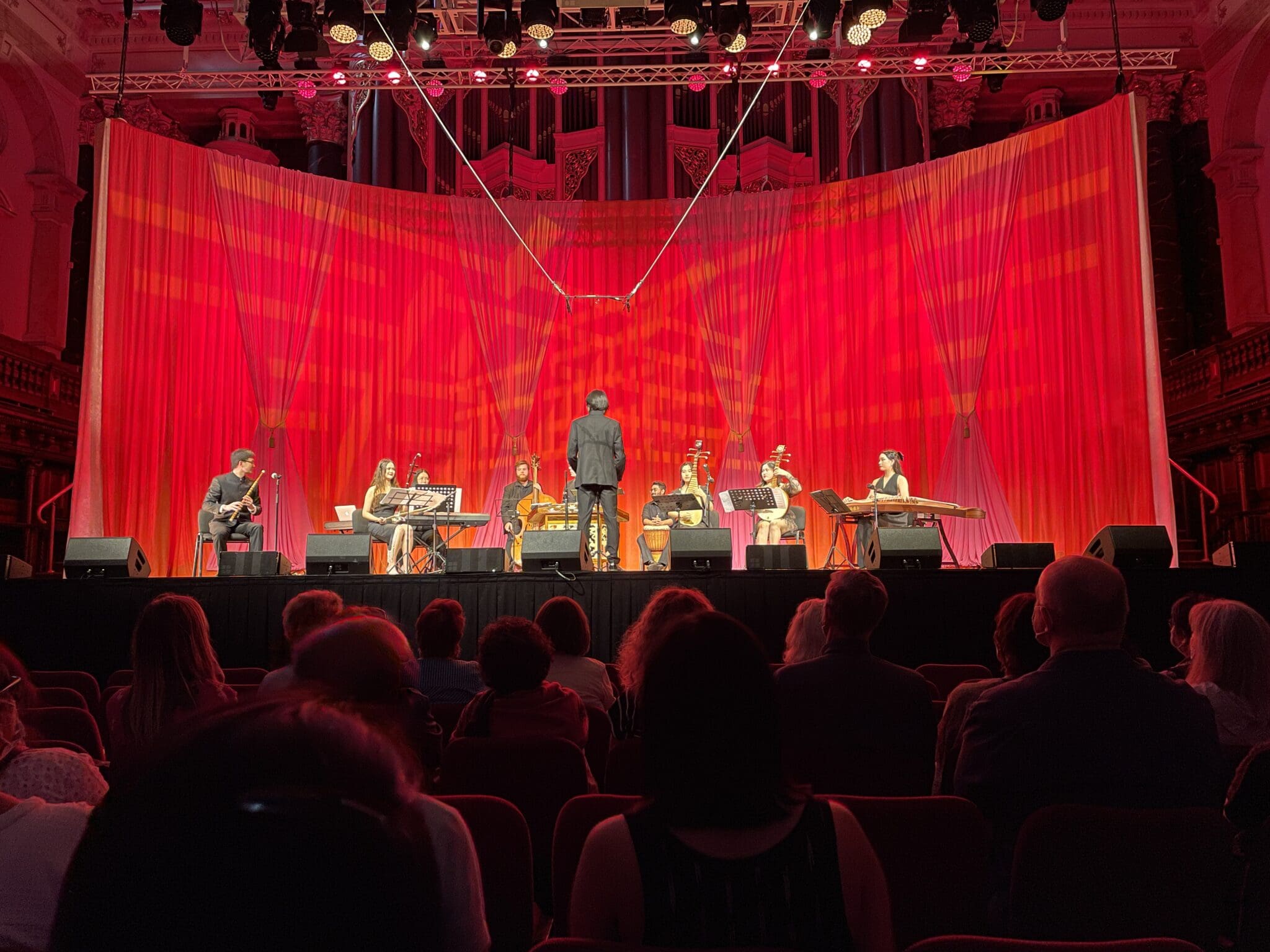When I entered Sydney Town Hall on 12 February, I was greeted by a stage with a large, scarlet curtain backdrop, ready for its first performers. While the sight of empty seats, music stands and microphones propped up were familiar, the array of instruments on display were unexpectedly diverse.
A keyboard. Djembes. A yángqín. A guzheng.
The opening act of the City of Sydney’s Lunar Spectacular Show was performed by the Waratah Ensemble of the University of Sydney Chinese Orchestra (SUCO), consisting of members trained in traditional Chinese and other orchestral instruments. This society, recently founded by yángqín player Alexander Poirier, is dedicated to performing and promoting Chinese music.
The first of the two works performed was 敦煌新语 (The Voices of Dunhuang), an instrumental composition by 姜莹 (Jiang Ying) that musically depicts the titular city’s rich history. This piece started with steady drones across the orchestra and improvised playing from the dízi, erhu and pípá, evoking a vast terrain and possibly the city’s distinct singing dunes. The middle section contained the main melody for the piece and was accompanied by driving rhythms. The sudden shift between these sections signalled a change in scenery, alluding to how the city was a gateway and important destination on the ancient Silk Road.
A highlight of the piece for me was in the finale when the instruments briefly exhibited their percussive potential. The players striking and tapping the bodies of their instruments like they were drums was a distinctive, experimental moment in the composition that caught members of the audience by surprise. The effect was like an outburst, one that transported the audience into an entirely different world. With a fast tempo and rapid playing, this intense concluding section portrayed the hustle-bustle and energetic spirit of the city today before coming to a unified halt.
The next performance was a rendition of 权御天下 (Sun Quan The Emperor), composed by 乌龟 (Turtle). This song was originally sung by 洛天依 (Luo Tianyi), the first Chinese VOCALOID character, and has colliding stylistic features from traditional Chinese music and the Japanese rock genre. The song’s simple chord progressions and repetitive melodies were elevated from a spectrum of warm, dramatic and playful tone colours, generated as the tune was passed around almost like a baton across the instruments. I first discovered 权御天下 through a popular guzheng and drum cover version on YouTube when I was studying the unit Understanding East Asian Music. I was thrilled on a personal level to see it transformed into a chamber ensemble arrangement and performed by an orchestra that was evidently enthused to play it. It was electrifying from the beginning right until the end.
After the performance, I was compelled to learn more about the intentions behind why these contrasting pieces were selected. In my interview with Poirier, he shared the personal significance of the works to the orchestra and the connections they had to SUCO’s goals:
“We chose The Voices of Dunhuang because we performed it last year at what was the biggest Chinese Music Ensemble concert ever had at the Sydney Conservatorium of Music. We really wanted to bring it back because it was what brought us together to create this orchestra and we thought it would be fitting to play it at our inaugural performance. Opening the Lunar Spectacular Show with this piece also linked with our vision as an orchestra. We want to be one that not only plays Han Chinese music, but music from all areas and ethnic groups in China.
This is the same with Sun Quan The Emperor. We wanted to show that SUCO is a versatile orchestra that isn’t restricted to one type of sound. We are trying to break the perception of Chinese music as a monoculture and to show that we can play just as much, if not more, than a symphony orchestra.”
This excitement for exploring and representing a range of Chinese music in future repertoire was echoed by Lucathea Cui, a performer in SUCO and the Australian Pípá Association.
“I’m looking forward to trying different pieces in SUCO. When I was young, I started learning this instrument and most of the pieces I played were classical Chinese music. After coming to Sydney, I tried different pieces in contemporary and popular music and I realised there are many possibilities for the future of Chinese music and instruments.”
With this event, SUCO has already proved that they are committed to providing more pathways for both professional musicians and audiences alike to participate in, understand and appreciate Chinese music. Their music offered more than simply an atmosphere, the feeling of celebrating Lunar New Year – the performance created a space where ideas could be communicated, values could be instilled and a sense of shared identity could be most strongly felt. SUCO’s inaugural performance was without a doubt as much technically impressive as it was symbolic. At the core of the program was a deep respect and desire for the continuation of China’s musical traditions. And yet, to witness this performance was to also see what the music stood for — a new, thriving community that will certainly lift Chinese music to new heights within the University of Sydney and beyond.





